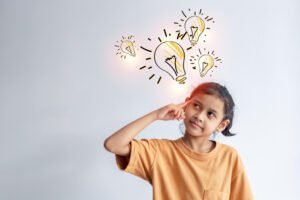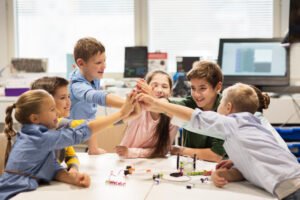Generation Alpha kids born between 2010 and 2025—are growing up in a world vastly different from previous generations. They’re digital natives who’ve never known life without smartphones, tablets, and constant connectivity. While technology offers incredible opportunities, it also presents unique challenges that require a new set of life skills.
These essential skills will help Gen Alpha children navigate both digital and physical worlds with confidence, empathy, and resilience. By developing these abilities before turning 13, kids will be better prepared for the complexities of adolescence and beyond.
1. Emotional Intelligence (EQ)

Emotional intelligence is the ability to understand, manage, and express emotions effectively while recognizing and responding to others’ feelings. For Gen Alpha kids, this skill is crucial both online and offline.
Why It Matters: In a world of emojis, likes, and instant reactions, understanding genuine emotions becomes more challenging. Kids need to recognize that a friend’s silence might indicate sadness, not anger, and that their own frustration with a video game shouldn’t lead to lashing out at family members.
Real-World Scenario: When your friend doesn’t respond to your text for hours, instead of assuming they’re ignoring you, consider other possibilities—they might be busy with family, dealing with a problem, or simply forgot to charge their phone.
Practice Activities:
- Keep an emotion journal for one week, noting three emotions you felt each day and what triggered them
- Practice the “pause and breathe” technique when feeling overwhelmed—count to five before reacting
- Use “I feel” statements instead of “You make me feel” when expressing emotions to others
Common Challenges: Online interactions can make emotions harder to read. Learn to ask clarifying questions like “How are you feeling about this?” rather than making assumptions based on short messages or delayed responses.
2. Effective Communication

Communication today happens across multiple platforms—face-to-face conversations, video calls, texts, social media, and even gaming chats. Gen Alpha kids need to master communication in all these formats.
Why It Matters: Strong communication skills help build better relationships, prevent misunderstandings, and allow kids to express their needs clearly. Poor communication can lead to lost friendships, academic struggles, and family conflicts.
Real-World Scenario: When working on a school project with classmates through a shared document and group chat, you need to communicate ideas clearly, ask questions when confused, and provide constructive feedback without hurting feelings.
Practice Activities:
- Practice active listening by repeating back what someone said before responding: “So you’re saying that…”
- Learn platform-appropriate communication—what works in a text might not work in an email to a teacher
- Practice difficult conversations face-to-face before having them online
Parent Partnership: Parents can model good communication by putting devices away during family meals and having regular one-on-one conversations without distractions.
3. Critical Thinking & Problem Solving

With endless information available online, Gen Alpha kids must learn to evaluate sources, think independently, and solve problems systematically.
Why It Matters: The internet contains both valuable information and complete nonsense. Kids need to distinguish between reliable sources and clickbait, solve problems creatively, and make informed decisions.
Real-World Scenario: When researching a school project, you find conflicting information on different websites. Instead of using the first result, you need to check multiple sources, consider the credibility of each site, and synthesize accurate information.
The Problem-Solving Framework:
- Define the problem clearly: What exactly needs to be solved?
- Gather information: What do you know? What do you need to find out?
- Brainstorm solutions: Come up with at least three possible approaches
- Evaluate options: What are the pros and cons of each solution?
- Choose and implement: Pick the best solution and try it
- Review results: Did it work? What would you do differently?
Practice Activities:
- When encountering conflicting online information, check at least three different sources before forming an opinion
- Practice the “5 Whys” technique—ask “why” five times to get to the root of a problem
- Create pros and cons lists for decisions, both big and small
4. Time Management

Gen Alpha kids face unique time management challenges: balancing screen time with homework, managing multiple online activities, and dealing with constant notifications and distractions.
Why It Matters: Good time management reduces stress, improves academic performance, and creates more time for fun activities. Poor time management leads to rushed homework, missed deadlines, and family conflicts over screen time.
Real-World Scenario: You have homework due tomorrow, want to play your favorite online game with friends, and promised to help with dinner. Instead of trying to do everything at once, you need to prioritize and create a realistic schedule.
Time Management Strategies:
- Time blocking: Dedicate specific time slots to different activities (homework, gaming, family time)
- The 2-minute rule: If something takes less than 2 minutes, do it immediately
- Digital time awareness: Use screen time tracking to understand how much time you actually spend on devices
Practice Activities:
- Create a visual schedule for after-school time, including homework, chores, and fun activities
- Set timers for different activities to build time awareness
- Practice estimating how long tasks will take, then compare with actual time spent
Parent Partnership: Work with parents to establish device-free times and spaces, creating natural boundaries that support time management skills.
5. Digital Literacy & Online Safety

This is perhaps the most crucial skill for Gen Alpha kids. Digital literacy goes beyond knowing how to use apps—it’s about understanding how digital platforms work, protecting personal information, and navigating online relationships safely.
Why It Matters: Gen Alpha kids are growing up online, but many don’t understand the permanent nature of digital footprints, how algorithms influence what they see, or how to protect themselves from online predators and cyberbullying.
Essential Digital Skills:
- Privacy awareness: Understanding what information is safe to share and what should remain private
- Critical evaluation: Recognizing fake news, scams, and manipulated content
- Digital footprint management: Knowing that everything online can be permanent and public
Real-World Scenario: A new online friend wants to meet in person and asks for your home address. Even if they seem nice and are your age, this is a red flag. Real friends don’t need your address to maintain friendship.
Online Safety Rules:
- Never share personal information (full name, address, school, phone number) with online strangers
- Think before posting: “Would I be comfortable with my teacher, parents, and future employers seeing this?”
- Report and block users who make you uncomfortable
- Tell a trusted adult if someone online asks to meet in person or requests personal information
Practice Activities:
- Review privacy settings on all platforms you use monthly
- Practice identifying fake news by checking multiple sources
- Create strong, unique passwords for different accounts using a system you can remember
6. Financial Literacy (Kid-Friendly)

Gen Alpha kids are growing up in an increasingly cashless world where transactions happen with taps, clicks, and voice commands. Understanding money—both physical and digital—is essential.
Why It Matters: Kids who don’t understand money’s value may develop poor spending habits, fall for online scams, or struggle with budgeting later in life. Many Gen Alpha kids see parents paying with phones or cards but don’t grasp that money is still being spent.
Real-World Scenario: You want a new game that costs $20, and you have $30 in birthday money. Before buying, consider: Do you need anything else? Could you wait for a sale? What will you do if you want something else later but don’t have enough money?
Key Financial Concepts:
- Earning: Money comes from work and effort
- Spending: Every purchase means less money for other things
- Saving: Setting aside money for future goals
- Giving: Sharing resources with others who need help
Practice Activities:
- Track spending for one month, categorizing purchases as “needs” vs. “wants”
- Set up a simple savings goal with visual progress tracking
- Compare prices for the same item across different stores or platforms
- Practice calculating tax and tips for purchases
Parent Partnership: Parents can involve kids in family budget discussions age-appropriately and explain the true cost of “free” apps that include in-app purchases.
7. Self-Care & Hygiene Habits

Self-care for Gen Alpha kids includes traditional hygiene plus digital wellness—managing screen time, taking breaks from devices, and maintaining physical health in a sedentary digital world.
Why It Matters: Good self-care habits establish the foundation for lifelong health and well-being. Kids who learn to take care of themselves physically and mentally are more resilient and better able to handle stress.
Comprehensive Self-Care Includes:
- Physical care: Regular hygiene, healthy eating, adequate sleep, and physical activity
- Mental care: Stress management, emotional regulation, and asking for help when needed
- Digital wellness: Taking breaks from screens, managing notifications, and creating tech-free spaces
Real-World Scenario: You’ve been playing online games for three hours and feel tired, irritable, and have a headache. Instead of continuing to play, recognize these as signs you need a break—step away from screens, drink water, and do some physical movement.
Daily Self-Care Checklist:
- Morning routine that doesn’t start with screens
- Regular meals and water intake
- Physical movement every day (even 10 minutes counts)
- Adequate sleep in a device-free bedroom
- Time in nature or away from screens
Practice Activities:
- Create a morning routine that energizes you for the day
- Set device reminders to take breaks every hour
- Identify your stress signals and develop healthy coping strategies
- Practice saying “no” to activities that drain your energy
8. Resilience & Coping with Failure

Gen Alpha kids face unique pressures from social media comparisons, online criticism, and the fear of public failure in digital spaces. Building resilience helps them bounce back from setbacks and continue growing.
Why It Matters: Resilience is the difference between giving up after failure and learning from mistakes. Kids who develop resilience are more likely to take healthy risks, persist through challenges, and maintain mental health during difficult times.
Real-World Scenario: You post a video you’re proud of online, but it gets more negative comments than positive ones. Instead of deleting your account or feeling devastated, you can learn to evaluate feedback constructively, keep what’s helpful, and ignore what’s not.
Building Resilience:
- Growth mindset: Believing abilities can be developed through effort and learning
- Perspective-taking: Understanding that setbacks are temporary and specific, not permanent and universal
- Support network: Having trusted people to talk to when things get tough
The Failure Recovery Process:
- Acknowledge feelings: It’s okay to feel disappointed, sad, or frustrated
- Analyze objectively: What went wrong? What was outside your control?
- Extract lessons: What can you learn from this experience?
- Make adjustments: How will you approach similar situations differently?
- Try again: Use what you learned to improve next time
Practice Activities:
- Share a story about a time you failed and what you learned from it
- Practice reframing negative thoughts: Instead of “I’m bad at math,” try “I’m still learning math”
- Create a “failure resume” listing mistakes and what each taught you
9. Teamwork & Collaboration

Modern collaboration happens both in-person and online. Gen Alpha kids need to work effectively with others across different platforms and communication styles.
Why It Matters: Most future careers will require collaboration skills. Kids who learn to work well with others, resolve conflicts constructively, and contribute to team goals will be more successful in school and work.
Real-World Scenario: Your class is working on a group presentation using shared online documents, video calls, and in-person meetings. You need to coordinate different personalities, work styles, and schedules while ensuring everyone contributes fairly.
Collaboration Skills:
- Active participation: Contributing ideas while respecting others’ input
- Compromise: Finding solutions that work for everyone
- Reliability: Following through on commitments and meeting deadlines
- Conflict resolution: Addressing disagreements respectfully and constructively
Practice Activities:
- Practice giving constructive feedback: “I like… I wonder… Next time…”
- Learn to ask clarifying questions instead of making assumptions about others’ ideas
- Take turns being the leader in group projects to understand different roles
- Practice apologizing sincerely when you make mistakes that affect the team
Common Challenges: Online collaboration can lead to misunderstandings. Always assume positive intent and ask for clarification when confused rather than getting defensive.
10. Basic Home & Safety Skills

Gen Alpha kids need traditional life skills plus modern safety knowledge, including smart home technology, emergency communication, and personal safety in both physical and digital spaces.
Why It Matters: Self-sufficiency builds confidence and prepares kids for independence. Safety skills can prevent injuries and help kids respond appropriately to emergencies.
Essential Home Skills:
- Kitchen safety: Basic cooking skills, knife safety, and cleaning up properly
- Personal organization: Keeping spaces clean and finding things efficiently
- Basic maintenance: Simple fixes and when to ask for adult help
- Emergency preparedness: Knowing important phone numbers, addresses, and emergency procedures
Modern Safety Skills:
- Smart home awareness: Understanding how voice assistants and smart devices work and their privacy implications
- Emergency communication: Knowing how to call for help using various devices and platforms
- Personal safety: Recognition of dangerous situations and appropriate responses
Real-World Scenario: You’re home alone for an hour after school. You know how to lock the door, prepare a simple snack safely, complete homework, and contact parents or emergency services if needed. You also know not to answer the door for strangers or share on social media that you’re alone.
Practice Activities:
- Learn to prepare three simple, healthy snacks safely
- Practice your family’s emergency plan, including evacuation routes and meeting places
- Organize one area of your room and maintain it for a week
- Learn basic first aid: how to clean and bandage small cuts, when to seek adult help
Parent Partnership: Parents should teach these skills gradually, allowing kids to practice with supervision before doing tasks independently.
Final Thoughts: Life Skills = Just Book Skills
Life skills aren’t just theoretical concepts to memorize—they’re practical abilities that improve daily life and prepare kids for future success. The key is consistent practice and gradual independence.
Implementation Roadmap:
- Week 1-2: Focus on one skill that interests you most
- Month 1: Add a second skill while maintaining the first
- Month 2-3: Gradually incorporate additional skills
- Ongoing: Regular check-ins to assess progress and adjust approaches
Key Success Factors:
- Start small: Choose one specific aspect of a skill to practice
- Be consistent: Daily practice is more effective than occasional intensive efforts
- Ask for help: Adults and friends can provide guidance and support
- Be patient: Skills take time to develop—celebrate small improvements
- Apply everywhere: Look for opportunities to practice skills in different situations
Remember, developing life skills is a journey, not a destination. Every Gen Alpha kid will progress at their own pace, and that’s perfectly normal. The goal isn’t perfection—it’s growth, resilience, and preparation for a bright future in an ever-changing world.
The world needs confident, capable, and caring Gen Alpha kids who can navigate both digital and physical spaces with wisdom and integrity. By developing these ten essential life skills, you’re building the foundation for a successful and fulfilling life.

